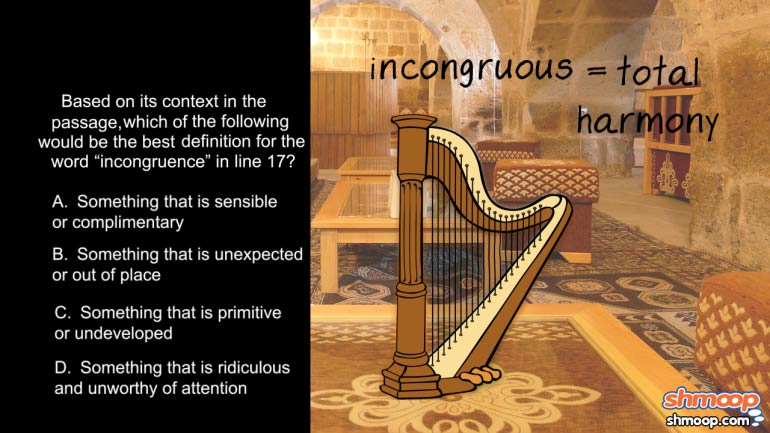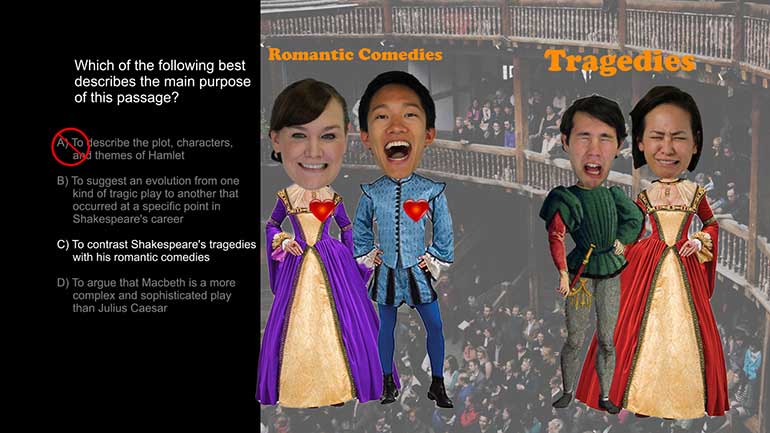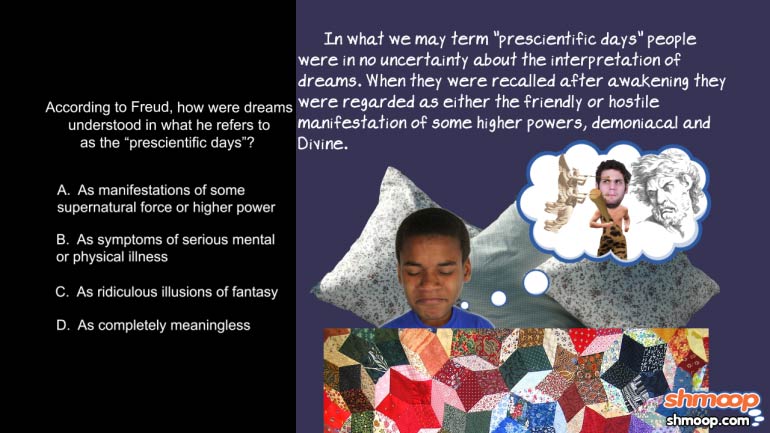ShmoopTube
Where Monty Python meets your 10th grade teacher.
Search Thousands of Shmoop Videos
ACT Reading 1.6 Humanities Passage 240 Views
Share It!
Description:
ACT Reading 1.6 Humanities Passage. Which of the following is not a similarity that the author notes between Brutus and Hamlet?
Transcript
- 00:04
Here's your Shmoop du jour, brought to you by Brutus. The ultimate back-stabber.
- 00:37
Which of the following is NOT a similarity that the author notes between Brutus and Hamlet?
- 00:45
There're no tricks to figuring this one out.
- 00:49
We just have to remember what Professor Bradley was trying to tell us about the similarities
- 00:53
between Hamlet and Brutus.
Full Transcript
- 00:55
The second paragraph is where the Professor zeroes in on these two, so we'll go back
- 00:58
and skim it again before we go any further.
- 01:04
Now that we've refreshed our memories, let's take a look at choice (D).
- 01:08
Most everybody knows that Hamlet was a bookworm, and even though Brutus's name sounds like
- 01:12
"brute," he's widely thought of as an intellectual.
- 01:16
Professor Bradley points out this similarity in paragraph two, so (D) is incorrect.
- 01:21
But what about choice (A)? The Professor does describe both Hamlet and Brutus as "philosophic,"
- 01:27
meaning that they both like to ponder the nature of knowledge, reality, and existence.
- 01:32
This description lives in the same world as choice (D), which we've already eliminated,
- 01:36
so we're sure (A) is wrong.
- 01:38
Could (C) be the right answer? Both Brutus and Hamlet are known for being highly concerned
- 01:43
with "doing the right thing," which is a little weird because they both end up becoming murderers.
- 01:49
Professor Bradley points out these "good guy" intentions, so we can get rid of (C).
- 01:54
Alright B, this one might be tempting, because if we've read or seen Hamlet, we know that Hamlet is
- 01:58
bummed about his dad's death.
- 02:01
The historical Brutus actually had a dad who died as well; however, there's no discussion
- 02:05
of this same theme in Julius Caesar or in the Professor's lecture.
- 02:10
This makes (B) the only choice not Bradley-approved...and the correct answer.
- 02:14
Seems like these guys really had a lot in common. Maybe they should've started a support group.
Up Next
ACT Reading 1.5 Social Science Passage. Based on its context in the passage, which of the following would be the best definition for the word...
Related Videos
ACT Reading: Humanities Passage Drill 1, Problem 1. Which of the following best describes the main purpose of this passage?
ACT Reading: Natural Science Passage Drill 1, Problem 1. Which of the following best describes the overall purpose of this passage?
ACT Reading Prose Fiction Drill 1, Problem 1. Which of the following best describes the overall purpose of this passage?
ACT Reading: Social Science Passage Drill 1, Problem 1. According to Freud, how were dreams understood in what he refers to as the "prescienti...




